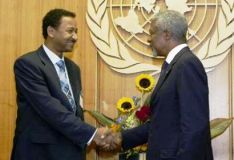US misrepresenting situation in Darfur for election gains: Sudan’s FM
By TAREK EL-TABLAWY, Associated Press Writer
UNITED NATIONS, Sep 29, 2004 (AP) — U.S. officials, by claiming that a genocide occurred in Darfur, are inflating the severity of the situation in the western Sudanese region to win votes in the upcoming U.S. presidential elections, Sudan’s foreign minister said.

|
| UN SG Kofi Annan greets Sudanese FM Mustafa Ismail before their meeting during the 59th session of the UN General Assembly at U.N headquarters in New York, September 28 |
The Sudanese government “is not saying that the situation (in Darfur) is normal,” Mustafa Osman Ismail told The Associated Press on Tuesday, on the sidelines of the U.N. General Assembly’s ministerial meeting.
Ismail, when asked to comment on concerns by some countries and groups who say that Sudan was not cooperating with humanitarian efforts and was misrepresenting the situation there, said that top U.N. humanitarian officials had indicated they were satisfied with strides taken by the government.
He said the United States was the only country describing the violence as genocide “because of an internal agenda linked to the elections, linked to the competition with the Democratic party to win the votes of African Americans.”
He also accused the Bush administration of focusing on the Darfur region in a bid to “deflect attention” away from the situation in Iraq, Ismail said.
On Thursday, the Security Council is scheduled to be briefed on the situation in the region by U.N. Commissioner for Human Rights Louise Arbour, who last week was in Sudan, U.N. officials said.
The bloodletting in Darfur began in February 2003, when two non-Arab African rebel groups launched attacks primarily on government and military targets to press demand for a greater share of power and resources for the region.
The government is accused of trying to put down the rebellion by backing armed Arab herdsmen known as Janjaweed who long have competed with villagers over Darfur’s scarce resources. The escalating violence has been described by the United States as genocide. The United Nations has said Darfur is the world’s worst humanitarian crisis.
Over 50,000 have died, and at least 1.2 million others displaced by fighting.
In Geneva on Tuesday, Arbour said she plans to tell U.N. Secretary-General Kofi Annan that the number of U.N. workers in Darfur should be “massively increased” to help protect the refugees.
The Security Council on Sept. 18 approved a resolution threatening oil sanctions against Sudan unless the government reins in the Arab militias, and ordered an investigation of whether the attacks constitute genocide.
The resolution also strongly endorsed the African Union’s effort to deploy a beefed-up force and an expanded monitoring mission that would actively try to prevent attacks and mediate to stop the conflict from escalating.
The African Union has about 80 military observers in Darfur, protected by just over 300 soldiers, monitoring a rarely observed cease-fire signed in April by the government and rebels.
Ismail described the resolution as “unbalanced,” arguing it does not “move in the positive direction sought by the government, which is cooperating with the world community to tackle the problem” in Darfur.
Still, Ismail said Sudan supports African Union efforts in the region and is seeking international aid and support.
